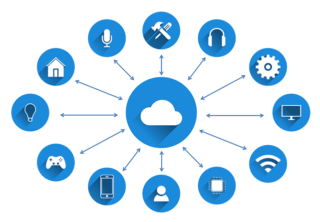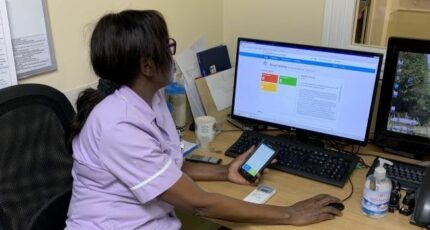Blog - Tomorrow's World, the role of digital technology in social care before, during and after Covid-19
This blog has been written by IPC Associate Jonathan Gardam. These are his observations and reflections regarding the role, usefulness and implementation of digital technology in social care before, during and after the Covid-19 crisis.
With the weekly crescendo of clapping, whooping, cheering and banging of saucepans reverberating across the country in grateful appreciation of the health and care workforce (and not forgetting other keyworkers) in their herculean response to Covid-19, there is one vital element which is being overlooked: the rapid and widespread deployment of digital technology as a means to support this national endeavor.
As social isolating and distancing becomes the norm (for the time being at least), most of us have increasingly turned to digital technology to keep in touch, shop, work and get advice as well as to entertain us. We are fast becoming experts in video conferencing and dab hands at online shopping and scouring the internet. This shift is also being felt in social care, as commissioners and providers look to digital technology to help find solutions to the many challenges and opportunities that are currently presenting themselves.
Social care is renowned for its innovation and ability to adapt and flex. It has had to cope with over 10 years of austerity after all, and there are many examples where digital technology has been successfully applied to manage demand, coordinate and streamline services, create efficiencies and deliver improved outcomes. Indeed, IPC has been at the forefront of capturing and sharing these examples for the benefit of others, and over time there has been steady momentum towards more and more councils and independent care providers testing and using digital solutions. However, Covid-19 has radically changed the health and care landscape and this digital momentum has moved into top gear almost overnight.
There have been several factors that have helped jump-start this shift:
- Social media channels are being extensively used to provide information, advice and guidance on Covid-19 and to connect services, people and communities. This is fueling both awareness of, and familiarity with digital alternatives to traditional ways of working and engaging with others.
- NHSmail has been made readily accessible to all social care providers to allow them to safely communicate with the NHS and councils. Prior to Covid-19, providers were required to complete the Data Security and Protection Toolkit to at least Entry Level before they could access NHSmail.
- Rules around data governance have been (temporarily) relaxed. These were considered barriers to faster roll-out of digital approaches.
- All care homes have been asked to use Capacity Tracker – an online digital tool to support the discharge of patients from hospital.
- Social care providers are being offered access to free digital software and tools, including access to Microsoft Teams to help them communicate electronically and support people to keep in touch with families and friends.
- Regular detailed national advice is being made available to support social care providers in the application of digital solutions.
- The government has recently launched a £500m grant to encourage technology firms to find innovative digital solutions to support vulnerable people who need help during the Covid-19 crisis. Many of these vulnerable people are being supported by social care services.
With these arrangements in place, digital solutions are fast becoming the mechanism and means by which the social care sector conducts itself. However, like all things, nothing is ever static. One of the many challenges that is likely to emerge once we start to move beyond the immediate crisis, is whether the sector can sustain its digital momentum and whether some of the current arrangements will endure.
The answers to many of these questions are not clear yet. However, there are some pointers that may help steer a path going forward:
- The new generation of social care staff and leaders must have digital skills. The keenly anticipated Adult Social Care Workforce Strategy must make this a key theme.
- Councils should look to support digital inclusivity for all local citizens. Expectations about digitalised social care is very likely to remain high.
- Councils and social care providers will need support in organisational change as they move towards digital solutions. Digital transformation is not a short-term technical project.
- There is need for parity in the digital offer afforded to social care as to that afforded to the NHS. The decisions made in the next spending round will be critical.
- Innovation will continue and councils and providers should be supported to remain creative and agile to new challenges and opportunities.
- The safe and appropriate use of data remains paramount. Despite the risks, greater use of digital technology has many advantages for providers, which in turn benefits commissioners. We would encourage councils to see supporting providers to keep their data safe and systems running, as a key part of their market shaping responsibilities.
Whilst there are many hurdles still to overcome, there is also much to celebrate and build upon. IPC is well placed to support both councils and providers as they embark or continue on their digital journeys. We are keen to hear your stories and to help find solutions together, to make digital transformation a reality for the benefit of local people and communities.

Related News

Supporting the provider care market to go digital and use technology safely
24/06/2024
Read the feedback from our webinar targeting Adult and Social Care commissioners

Supporting the Care Provider Market to use Technology Safely
30/05/2024
Join our free webinar 4th June 12.00-13.30





